Thanator - For and Against
"Thanator - the Jungle Moon": a resonant phrase with a promising sound, inspiring hopes in prospective readers of Lin Carter's series of eight novels set on Callisto. Big question: are the hopes at all fulfilled? We began to tackle the Jandar series on our Callisto page. But we only considered the first three volumes. Now let's try to size up the series as a whole.
grounds for good-will

Is Thanator just a pastiche of Barsoom? And if so, is that a negative criticism? "Pastiche" need not mean "failed pastiche", after all.
Another point to consider - bearing in mind that reading is not a merely passive occupation; that to a considerable extent, how much one loves a book depends upon how much one wants to love it -
Stid: You're slipping that one in very deftly! Not sure you can take my agreement for granted on that issue. Shouldn't books make you love them -
Zendexor: Depends what the books are for. Some just cater for addicts. Anyone who yearns for more ERB-quality sword-and-planet adventure will approach the Jandar series with a tremendous amount of good-will. Bear in mind that my own comments are coloured by this sort of hopeful good-will. I'm an addict, all the while rooting for Lin Carter to succeed.
And there is no doubt that he can write well enough.
...I discovered that it is more difficult than you might think to walk through a wall, even into one you know isn't really there. As I approached the barrier, my eyes only an inch or two away from what seemed to be a solid surface of rock, I marveled at the realistic detail of the illusion. For I could see the very grain and texture of the imaginary stone, cracked and pitted, upper edges of protuberances littered with granules of rock dust...
Lankar of Callisto, p.155
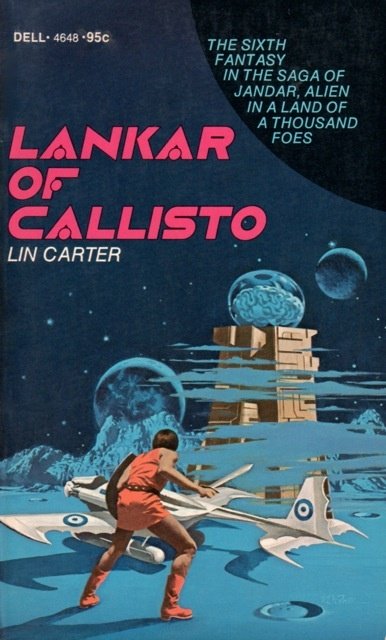
Harlei: You picked a good bit there, a bit of facing the unknown. Pity it doesn't happen more often. Thanator is rather small, I find. I keep wanting it to be bigger.
Zendexor: Ah, that's a question: is Thanator simply too small? Well, it's bigger than our Moon, don't forget. And our Moon has been the venue for great imagined cultures. Think of Burroughs' The Moon Maid and Wells' The First Men in the Moon.
Also, one of LC's clever decisions effectively increases Thanator's subjective size:
...If the Lankar-jan were heading west, very soon now they would be able to see the vast jungled tract called the Grand Kumala. But if this did not happen, they could as well be flying north or south or east... - Renegade of Callisto, p42-3
You see? By denying his characters any direction-finding capability (no compass navigation, no Pellucidarian-style homing instinct, and an atmosphere which mostly hides the stars) the author has ensured that wandering Thanatorians easily get lost.
So: the Jungle Moon is big enough. The setting is good enough for an eight-volume series. Thanator comes across to the reader - to me, at any rate - as a world with a distinct character.
Stid: Then why does it make me yawn?
not sustained
Zendexor: I'll admit, that as a playground for the imagination it should work better than it does. So, all right, let's ask ourselves: What's gone wrong?
Stid: Let me take over here. I'll tell you the simple reason why the series, by and large, fails. The good writing - and there is some - is not sufficiently sustained. It's as simple as that.
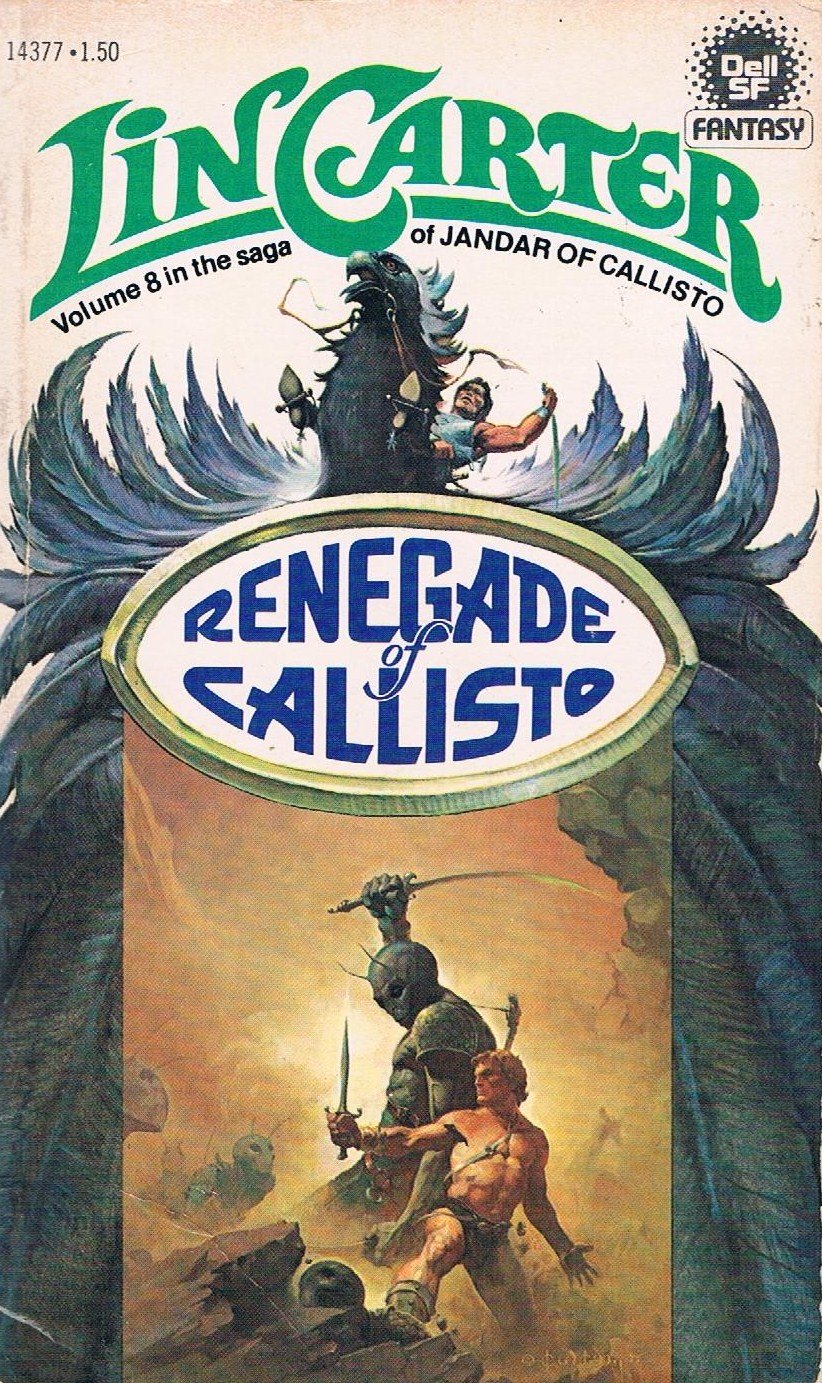
I'll be fair and quote from a passage (the stampede scene in Renegade of Callisto, p.131-2) that's by and large well done, but that is marred nevertheless by the italicized archness at the end. Note: the italics are the author's own (and that's the problem):
...The two warriors clambered to the peak of the hill and lay there, panting. All about them and to every side a dust-gray sea of exhausted beasts raced by. Many staggered and fell, to be trampled to a pulp in moments. Others showed red, glazed eyeballs, tongues lolling, mouths flecked with foam; soon they, too, would fall to be trodden down by those behind them.
And then, almost as swiftly as it had broken upon them, the storm passed. Suddenly, with magical swiftness, the herd melted away and was gone, dwindling across the plain. Koja and Borak stood, peering through the dusty murk; the plain was naught but bare, trampled earth as far as either of them could see. They could no longer discern the wreckage of the wain, nor any sign of man. Here and there, like driftwood cast up by a freak swirling of the tide, the carcass of a dead beast lay in its gory ruin.
The thundering of thousands of hooves faded into the distance.
Gradually, the thick mantle of dust, swept away by the wind, cleared from the golden sky.
The stampede had come and gone, and they were miraculously unhurt.
But - what of their comrades?
Carter keeps doing this: again and again he italicizes the obvious. It's as though what is, actually, the natural next question to ask, must count as the universe's most astonishing mystery. You don't find ERB inflicting this type of irritant.
poeometrics
Zendexor: I think you're on to something, Stid. We need to roll up our sleeves and work at finding more exact comparisons between Burroughs and Lin Carter. Convert our wafflings into an exact science! Call it poeometrics! (Nothing to do with Edgar Allan Poe, by the way... just with the Greek for creation.) I'll choose a pair of passages, one from each author, which tackle the same theme, so that we can compare the treatments.
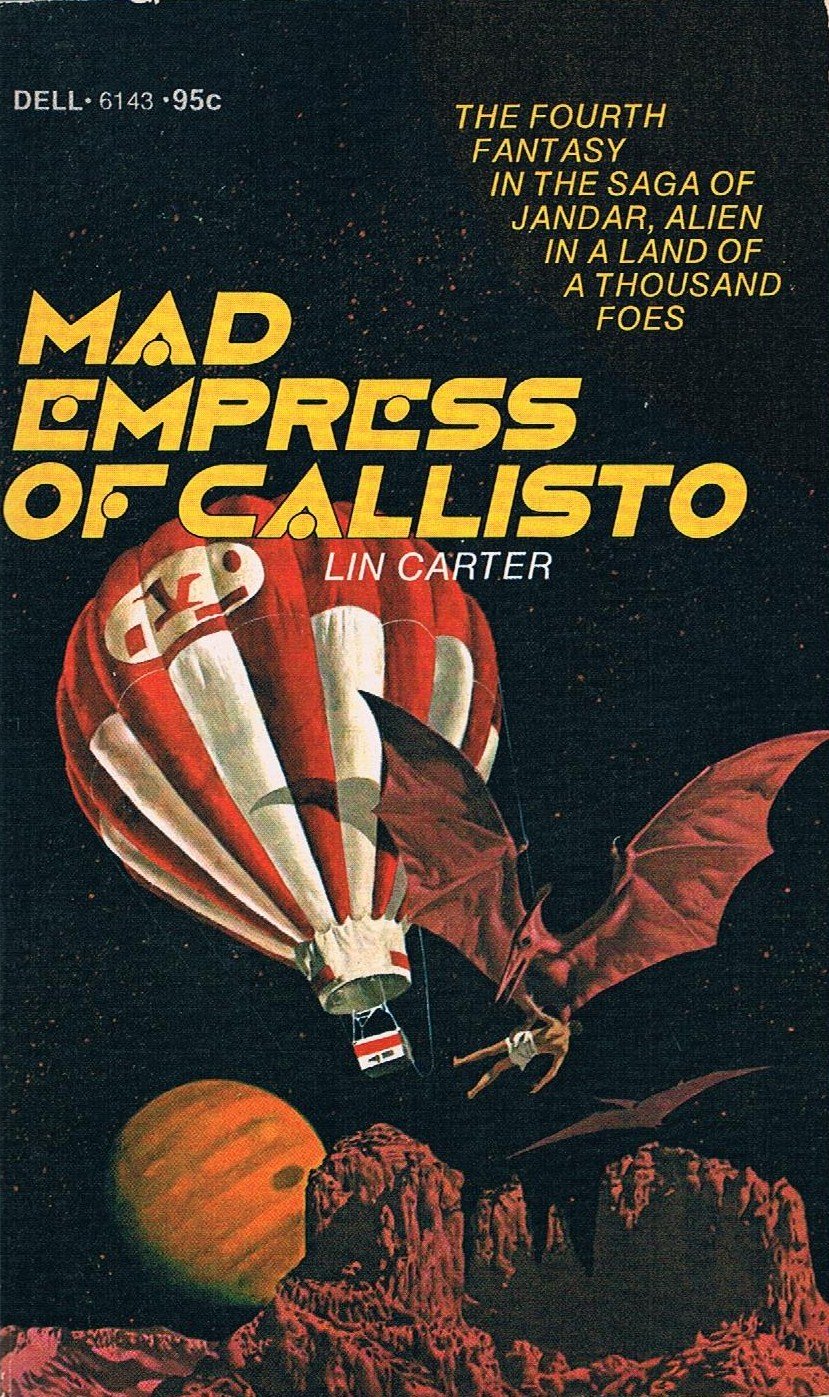
The theme is: need for warning of enemy attack.
First, here's Burroughs' Barsoomian hero Hadron of Hastor, in A Fighting Man of Mars, cogitating on the need to warn the Empire of Helium of a pressing danger from Jahar's secret super-weapon.
...the thought that upset my mind now almost to the exclusion of the plight of Sanoma Tora was that somewhere in the thin air of dying Barsoom a great Heliumetic fleet was moving to attack Jahar, or at least that was what I supposed, since I had no reason to doubt that the message I had given to the majordomo of Tor Hatan's palace had not been delivered to the Warlord. To lie here enchained in the pits of Tjanath while the great fleet of Helium sped to its destruction, filled me with horror. With my own eyes had I seen the effect of this terrible new weapon, and I knew that it was no idle dream upon the part of Nur An when he had stated that with it Tul Axtar could conquer a world; but there was a defence against it. If I could but regain my freedom, I might not only warn the ships of Helium and save them from inevitable doom, but also, in connection with my quest for Sanoma Tora in the city of Jahar, I might discover the secret of the defence against the weapon which the Jaharians had evolved.
Freedom! Before it had only seemed the most desirable thing in the world; now it had become imperative.
Now to compare Burroughs' scenario with a parallel one from Lin Carter...
In Renegade of Callisto, chapter 14, we learn (during a couple of paragraphs on page 149 - over half a page of explanation) that the mercantile empire of Perushtar had turned hostile to Ganatol, a city allied to Jandar's home city of Shondakor. Jandar's friend Prince Valkar muses for a further paragraph about how this will upset Jandar who has friends in Ganatol. Then:
For another thing, there was the safety of Shondakor itself. Although the Golden City of the Ku Thad was probably the single most powerful of all of the cities of Callisto, Shondakor lay not far upriver from the center of the Perushtarian dominion. And, in any martial exercise, it would be but one city against four...
And those were unhealthy odds.
True, Shondakor had shared bonds of close alliance with the nearer of the four cities of the Bright Empire of Perushtar, the city of Soraba, whose Prince had joined with Shondakor, and with the free city of Tharkol in the great expedition to the Far Side of the Jungle Moon, where the combined forces of all three realms crushed forever the menace of the insidious Mind Wizards.
But in any real contest of arms, would Soraba continue to recognize her alliance with Shondakor, or would blood tell, and Perushtarian join with Perushtarian?
It was hard to guess what might happen under those circumstances.
But there was one thing that Prince Valkar knew for certain. And that was that the first advance warnings of warlike and imperial ambitions on the part of the Bright Empire had already been dangerously delayed. For Xara of Ganatol had been intercepted by warriors of the Yathoon before she had been able to bring the news to Jandar and Darloona, and ask for their help.
Thus Shondakor has, as yet, no intimations of the danger that impended from Perushtar.
And that news, Valkar grimly knew, was very, very important. No time must be wasted before Jandar and Darloona were apprised of these events. And it was of enormous and vital importance that Valkar and Xara bring the word to the attention of the Prince and Princess of the Golden City without any more delay...
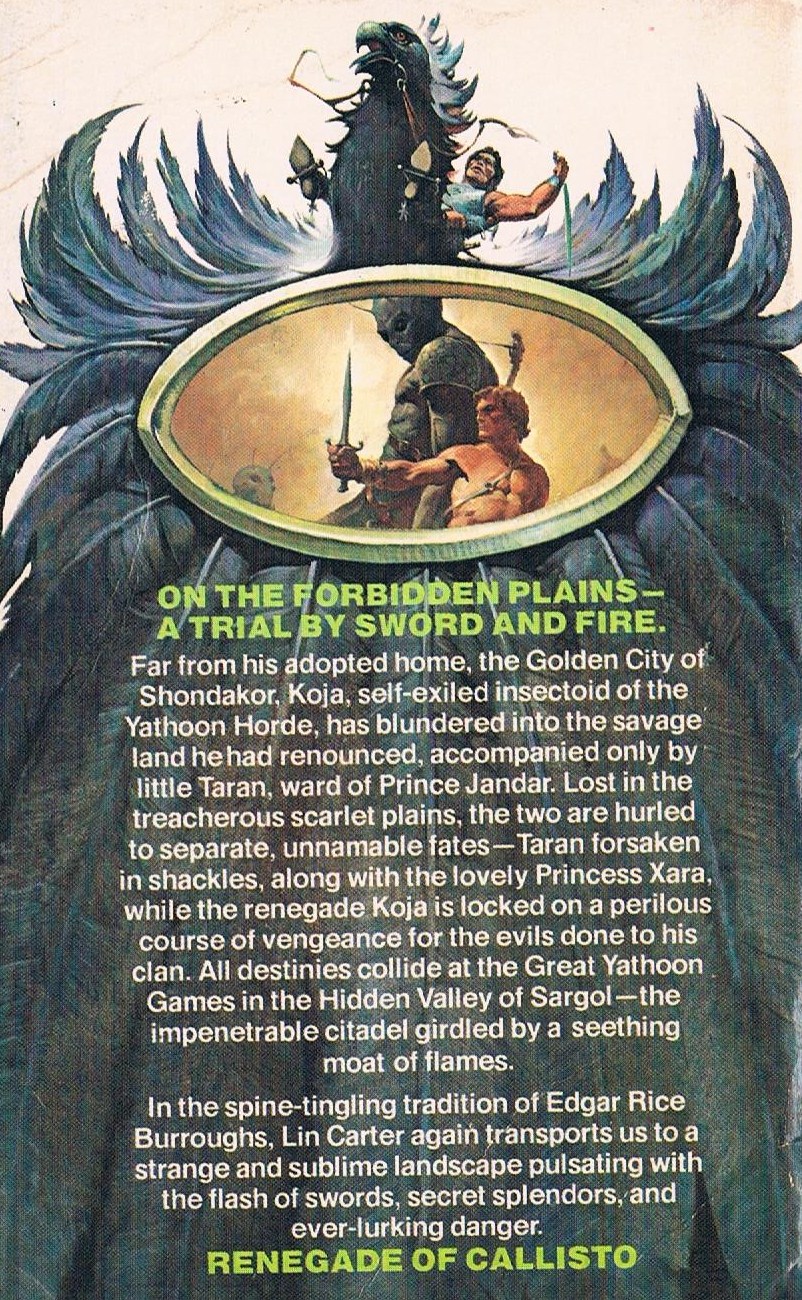 Renegade of Callisto - blurb
Renegade of Callisto - blurbStid: All right, so there's your pair of examples. What do we do with them?
Zendexor: Poeometrics - here defined as the science of measuring literary effect - is not a science with agreed units...
Stid: We certainly need an agreed basic unit of boredom. How about "the drag", and ten drags equal one yawn...
Zendexor: I was about to say, since we don't have units, if we're going to get anywhere we'll have to use ratios... We all see how Lin Carter's excerpt drags in comparison with the far more zappy extract from the Barsoom novel. This supports your contention, Stid, that Carter simply can't write well for long. But to clinch it quantitatively we'd have to find more examples...
Harlei: My turn! Let me quote you some sentences in LC that do bear comparison with those in ERB.
Here's one from Renegade of Callisto, page 168:
Time had gnawed and worried at the fabric of the mighty walls, and all but obliterated the ornamental carvings which festooned the portals and the arches.
And here's another - from three pages further on:
Night had fallen upon the Jungle Moon. The stars blazed, clear and brilliant, in the pure skies here near the pole.
One by one, the glorious and many-colored moons of Jupiter rose above the edges of the world to flood the snow-fields and, with their vivid hues, to gild the peaks of the Black Mountains with colored fire.
Stid: Not bad, though one might quarrel with the word-order (shouldn't it be "to flood with their vivid hues the snow-fields, and to gild..."). Also, the repetition of "colored" is a bit weak...
Harlei: But isn't ERB always getting away with verbal lapses, transcending them by means of his mastery of rhythm, as Zendexor would say?
Zendexor: Though please note I'm not saying that the verbal lapses in ERB are all that frequent. Allow me to contribute another "parallelism". Let's compare what you've just quoted from Renegade, with the following ERB passage, the scene in Tor Hatan's garden, in A Fighting Man of Mars:
...It was one of those lovely nights that transform old Barsoom into a world of enchantment. Thuria and Cluros were racing through the heavens, casting their soft light upon the garden of Tor Hatan, empurpling the vivid, scarlet sward and lending strange hues to the gorgeous blooms of pimalia and sorapus, while the winding walks, gravelled with semi-precious stones, shot back a thousand scintillant rays that, clothed in ever-changing colours, danced at the feet of the marble statuary that lent an added artistic charm to the ensemble...
discarding hypotheses
Lin Carter never gets this good. I think we're going to end up all agreeing with Stid.
Harlei: I dare say - but we don't want to, do we?
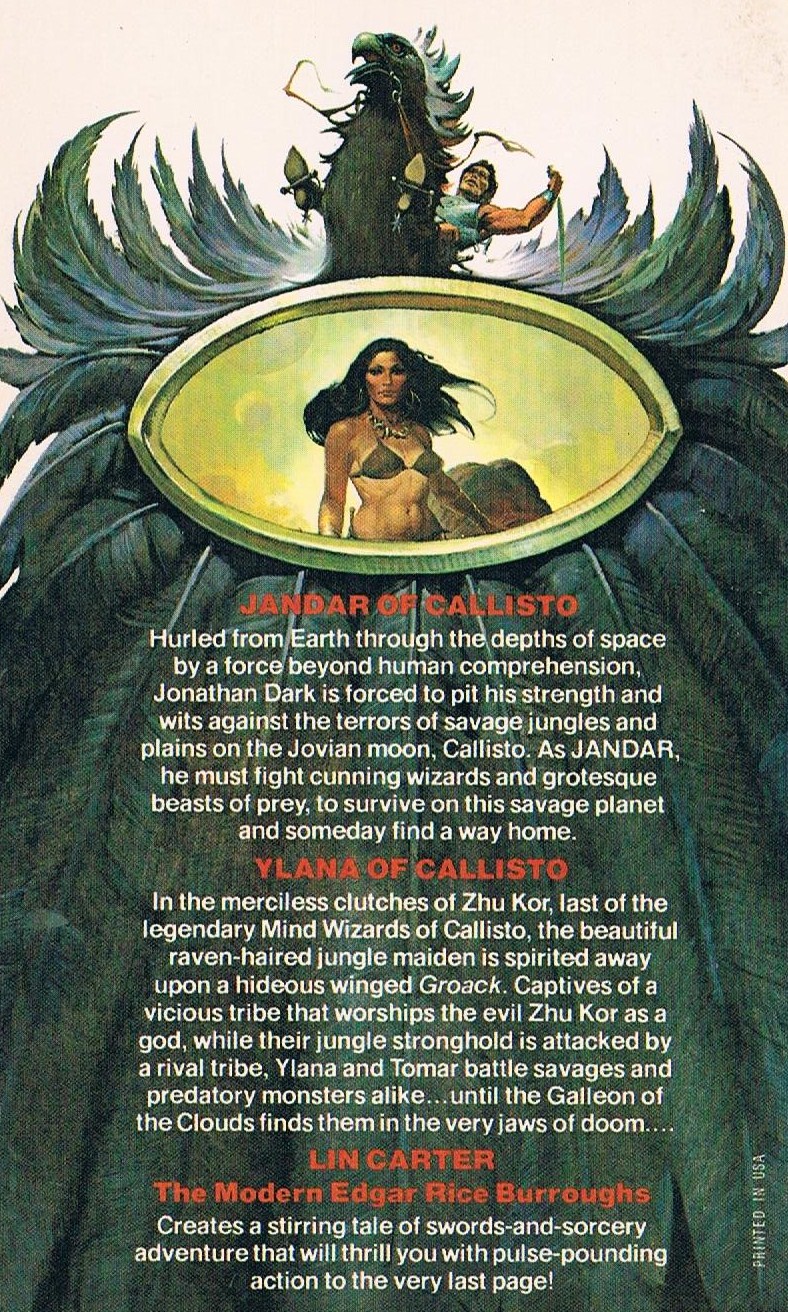 Ylana of Callisto - blurb
Ylana of Callisto - blurbStid: That's right, you don't. Your wishful thinking is firmly on the side of accepting Thanator with open arms - for that means adding another eight volumes to the available library of sword-and-planet goodies. Whereas I say, no matter how much we argue about it, we are bound to conclude that even if LC occasionally gets good, he can't keep it up the way ERB can. Carter is not generally as good a writer as Burroughs: and it's not just style, it's pace. Carter's stuff tends to drag. At least, it drags from volume 4 onwards. I'm not sure why. Maybe he should have given his Thanatorians fliers, to hurry the plots up a bit -
Harlei: But there are no fliers on Venus (except one), and ERB's Amtor series is nevertheless gripping. Not to mention Tarzan's Africa and Innes' Pellucidar. Fliers aren't the answer.
Zendexor: In any case, fliers could be seen as a problem
rather than as a solution: fast fliers might, in the hands of a lesser
writer, ruin the plot by making things too easy, wiping out the precious
sense of distance which is in short supply on a small planet. So you
could have said that Thanator ought to be all the better for not having fliers.
It's in your remark about pace that you hit the nail on the head, Stid.
Stid: Then let's conclude: Lin Carter's long-windedness is the key to his inferiority. End the page on that note, eh?
Zendexor:
Not so fast. Be careful here - some of ERB's plot-stages are very
slow. Exciting but not fast-paced. On the contrary, much of the
excitement in ERB's best scenes comes from suspense and the build-up of
atmosphere and mystery rather than action. They're exciting because they're slow-paced.
Two examples: the first chapters of The Master Mind of Mars, in which the hero becomes an assistant to Ras Thavas; and the unforgettable episode in A Fighting Man of Mars when Hadron is in the ancient tower cornered by the great white ape.
So - pace isn't the answer either. We're not there yet. What is the answer, then? What does ERB have that LC doesn't?
Stid: Go on, answer your own rhetorical question - I've had my say.
digging up the answer
Zendexor: Let me start by pointing out LC's lack of converting power. If you happen already to want what he provides, he can (in places) be a reasonably good read. But he won't convert anyone to the genre of planetary adventure. He won't influence anyone, as Leigh Brackett was influenced by reading Burroughs' The Gods of Mars.
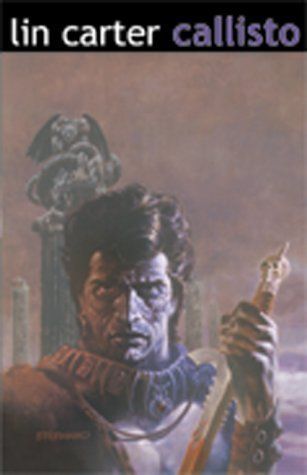
Stid: Then why is it so? At the moment you're just skirting the issue like some hovering vulture... it's time to swoop.
Zendexor: I prefer a mining metaphor here. My deep-drilling equipment is set up and ready. Here goes. On our Barsoom page we conclude that ERB's secret is that he somehow is able to enlist our co-operation, to help make his creations cohere. The reader is, as it were, brought "on side", motivated to make the necessary excuses, to suspend disbelief, to give the writer and the story the benefit of every doubt - in short, to join gladly in the work.
Harlei: And in your view, LC doesn't manage this kind of recruitment operation?
Zendexor: He does do it but only at one remove! He gets us to root for him, he gets us to hope he'll succeed - but all the while we can't help but judge him by ERB's standard...
Stid: You can't blame him for that. It's inevitable in a pastiche. Even down to the phoney-editorial comments - I have one right here, from page 114 of Ylana of Callisto:
I do not know what Jandar means by a "karkadan". He has evidently forgotten that he has never previously described one of these beasts in his journals.
Zendexor: Yes, I know, but -
Stid: Hang on, there's more. Let me sew this one up. When, on page 169 of Renegade, the Yathoom emperor Kamchan is described as a "cruel and sadistic bully", we try our best to say to ourselves: this is all right because the plot at this point requires him to be a cruel and sadistic bully, and never mind the apparent contradiction between this and the oft-repeated assertion that the Yathoon are without emotion and therefore not given to cruelty. After all, doesn't ERB likewise give us an inconsistent picture of the Tharks, calling them a "just people" yet saying they are given to torture?
Writers of pastiche are always going to get into trouble -
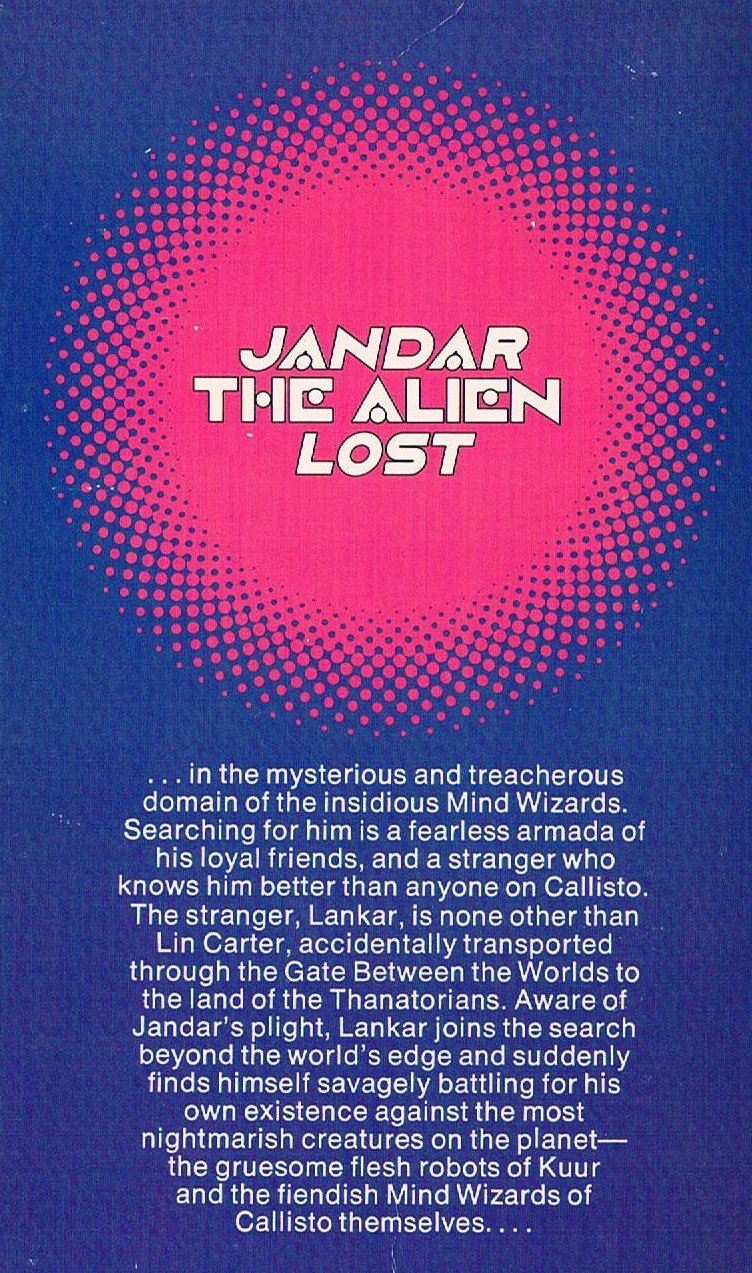 Lankar of Callisto - blurb
Lankar of Callisto - blurbZendexor: Halt! You have sufficiently "sewn up" your contribution, Stid, and I think we've now all reached the stage of exhaustion, at the end of a lengthy process of elimination which should allow us to understand, finally, what's wrong with Thanator:
Lin Carter is too much aware of what he is doing.
ERB, by contrast, didn't really understand the source of his own power; it just poured out of him. Like one possessed, he just let it flow. Lin Carter on the other hand is always looking over his shoulder to make sure he's on the right ERBian track... an inevitable problem, as Stid has pointed out, with writers of pastiche.
The challenge of such writing is huge, and success depends upon hiding all the hard work. LC leaves too many traces of the effort he puts in to conform to the canon. It would have been better if he had not tried so hard, better if he had contented himself with more general inspiration, and with fewer specific parallelisms both of plot and of style.
His one solid achievement in the Jandar series has been to create Thanator as a world in its own right, with its own personality, rather than just a copy of Barsoom. But with regard to what happens on this adquately-built stage, he has failed to erect a Barsoom-quality narrative. He neither manages to equal Burroughs' tone, nor finds a sufficient resonance of his own.
Lin Carter, the Jandar series: Jandar of Callisto (1972), Black Legion of Callisto (1972), Sky Pirates of Callisto (1973), Mad Empress of Callisto (1975), Mind Wizards of Callisto (1975), Lankar of Callisto (1975), Ylana of Callisto (1977), Renegade of Callisto (1978).
A swordfight in Jandar of Callisto is unkindly, unfairly and irrelevantly juxtaposed with an excerpt from Perelandra which completely outclasses it, in Unreasonable demands and absurd comparisons.
For a good view of the non-human sophonts of Thanator see Callistan arthropod tribe.
For an extract from Black Legion of Callisto see Stampeding bird-horses.
For an extract from Sky Pirates of Callisto see Borne aloft in the skies of Callisto.
>> What to see on Callisto and Barsoom











































